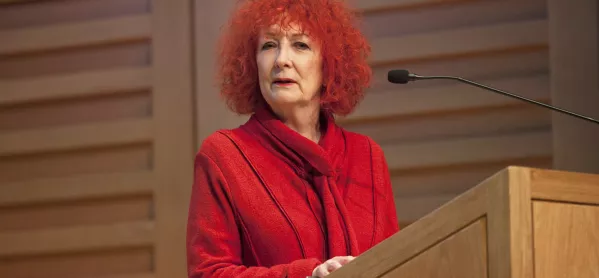- Home
- ‘We should not wait for change to come - we need to be its agents’
‘We should not wait for change to come - we need to be its agents’

As a working-class mum of three living on a council estate in the mid-1960s, Margaret Prosser could not have imagined that she would one day rise to become deputy general secretary of the Transport and General Workers’ Union, President of the Trades Union Congress and a Labour life peer.
When her husband became paralysed through illness in 1966 at the age of 29, her prospects looked bleaker still - but it gave her an insight into the importance of politics in people’s lives and an appetite for activism. At the same time, her experience as a mature student at a London polytechnic gave her a sense of the value of education and a notion of what she was capable of achieving.
Baroness Prosser’s story is remarkable, but it is mirrored in the lives of thousands of women who, in the course of the last century, have lived the kind of change they wanted to see in the wider world. In the 100 years since the Representation of the People Act 1918 gave females over 30 the right to vote, women have seized the opportunity to benefit from further education, but they have also exercised huge influence over its shape and direction, pressing, for the most part, for a system that is fairer, more equitable, and lifelong.
Women who shape FE
It is this story that the Further Education Trust for Leadership wants to tell through its new series of blog posts highlighting the lives of the women who have shaped further education in the UK.
The struggles of the suffragists and suffragettes remind us that we should not wait patiently for change to come - we need to be its vigilant agents. This needs to be particularly true in the world of further education and skills, for so long the strong main corridor through which women have been able to emerge into different worlds, whether through vocational courses, basic skills or Esol programmes, or access-to-HE courses. It has also been one of the main routes through which women have been able to challenge stereotypes and change the direction of their lives.
I highlight Baroness Prosser, the subject of the latest article in our series, because she not only changed her own life through education but also sought to widen opportunities for women to do and be something different in their lives, most notably through the hugely important Women and Work Commission report, published in 2006. Her story also shows the importance of entry points, whether that is through volunteering, activism or union contact in the workplace. More and different further education, at every stage of life, is crucial to supporting women to realise their full potential.
Sexism and discrimination
It has not been easy. Baroness Prosser had to overcome appalling sexism and discrimination in the male-dominated trade-union movement, particularly in her early career. The early movers and shakers had to be strongly motivated - and they were. In many cases, that motivation took the form of not wanting their daughters to live lives like theirs. Their struggles provided a crucial example to those who followed, particularly to those from families traditionally excluded from educational opportunities. I always say that further education honours the ordinary. But the sector is also honoured to have been so crucial in the lives of so many extraordinary women.
More than a decade after the publication of the Women and Work report, there remains much to do. Women are still under-represented in the boardroom, in both public and private sectors - and pay equality remains a distant prospect. At the same time, despite the reality of demographic change and the changing needs of the economy, opportunities for men and women to learn later in life have been dwindling at a bewildering rate. Careers advice continues to fail working-class girls and women and too little is done to tackle stereotyping in the workplace.
The challenges are enormous, in FE and in society as a whole. Education is crucial to all our futures but if we are not prepared to say what it is we want and agitate for it, we are bound to lose. That is the lesson for the future we can only get by looking back.
Dame Ruth Silver is president of the Further Education Trust for Leadership. FETL’s blog series on 100 years of women in FE can be found here.
Want to keep up with the latest education news and opinion? Follow Tes FE News on Twitter, like us on Facebook and follow us on LinkedIn
Keep reading for just £1 per month
You've reached your limit of free articles this month. Subscribe for £1 per month for three months and get:
- Unlimited access to all Tes magazine content
- Exclusive subscriber-only stories
- Award-winning email newsletters


